How to Stop Facebook from Tracking Me & Keep My Location Secret
Do you ever feel like Facebook knows a bit too much about you? That's because it does. Facebook is something that many people can't live without, but behind the constant scrolling and updates, it listens and watches our online lives all the time. From monitoring your browsing history to gathering location information, its influence extends far beyond what most users know. If you're curious about how to stop Facebook from tracking me, you're in good company. In this guide, we'll take you through the newest privacy controls, secret tracking techniques, and most importantly how to turn off Facebook's new tracking method. Let's reclaim control of your data.
In this article:
Part 1. What Data Does Facebook Collect?
Facebook gathers much information, usually more than people know about it. It gets your name, email, phone number, birthday, and details regarding your work, education, and interests. Your platform activity - posts, comments, likes, shares, and interactions with friends - is monitored continuously. It also tracks your device and location information, including your IP address, device type, GPS coordinates, and Wi-Fi and Bluetooth connections. In addition to Facebook itself, the platform tracks your off-Facebook and browsing history on websites, apps, and advertisers who share data with it.
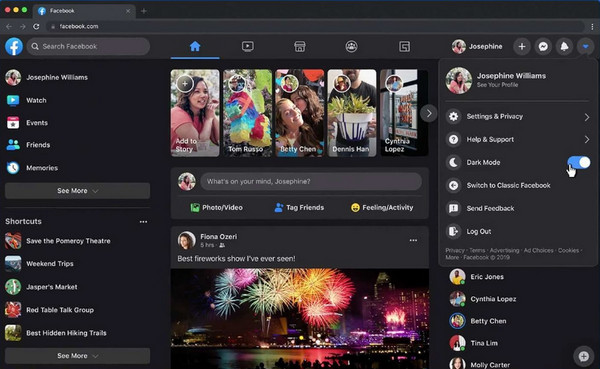
Messenger chats, call logs if permission is given, and voice interactions can also be gathered. Further, Facebook utilizes facial recognition to recommend tags on pictures and capture metadata, like location and device information, from images uploaded. The site creates an advertising profile based on engagement, likes, and business interaction. With that much information gathered, most people wonder: how can I stop Facebook from tracking me? The following section will discuss the new privacy settings and how to reclaim control over your data.
Part 2. Use a Third-party Program to Stop Facebook Tracking
Facebook's privacy settings can provide some control over tracking, but they are usually hard to understand and don't entirely prevent data gathering. A safer approach is to employ a third-party application like imyPass iLocaGo that successfully keeps Facebook from knowing your actual location.
imyPass iLocaGo is a robust location-spoofing application that enables you to spoof your GPS location anywhere on the globe. Thus, Facebook can't get accurate location information. By concealing your location, iLocaGo prevents targeted advertising, unwanted data gathering, and unnecessary privacy invasions. This is for you if you require an absolute method to stop FaceBook from tracking me.
If you have not downloaded the iLocaGo on your PC, click the button we have here. Install the app and follow the setup it requires you to accomplish before you can launch it.
Next, connect your phone to the PC so you can change the location of it. Then, choose the Modify Location from its main interface.

When you do that, a map will appear on your screen. Search the area where you want to spoof your location and click it on the map. After that, click Sync to the device so your location will appear where you choose. With this app, you can also find fake locations on Instagram.
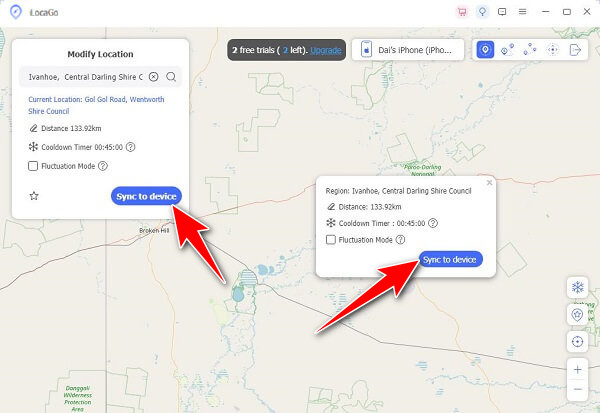
Part 3. 5 Ways to Stop Facebook Tracking in Settings
How do I stop Facebook from tracking my web browsing? Facebook monitors your personal information, from what you do on the site to what you do on other sites that you interact with. Although some of this monitoring is integral to Facebook's ad model, you can work to restrict how much data the site gathers about you. Listed below are some necessary settings that you should modify to increase your privacy and reduce Facebook's capacity to monitor your online activities.
1. Execute Facebook's Privacy Checkup Tool
The Privacy Checkup feature is a good place to begin when controlling your privacy settings. The feature gives you a guided tour of what information you are sharing on Facebook and assists you in changing your settings to minimize unwanted tracking. To find it, click on your profile picture, navigate to Settings & Privacy, and then Privacy Checkup.
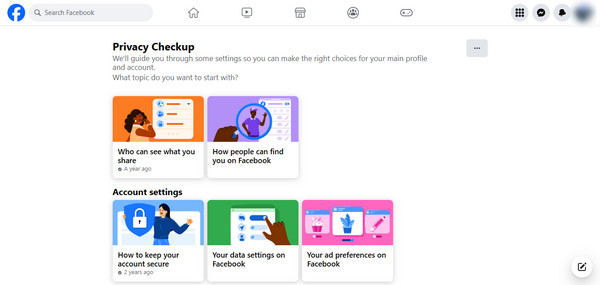
You can see several categories where Facebook monitors your activity, including posts, profile data, and app permissions. Go through each step to change the settings as per your choice. This tool ensures you are sharing only the information you are okay with, giving you greater control over your privacy.
2. Clear Your Activity Log
Facebook automatically tracks your searches, interactions, and other activities, building a comprehensive record of your activity. Clear your activity log is crucial if you don't wish Facebook to store this data. To do so, click your profile picture or the three horizontal lines in the top-right corner, then navigate to Settings & Privacy and choose Activity Log.
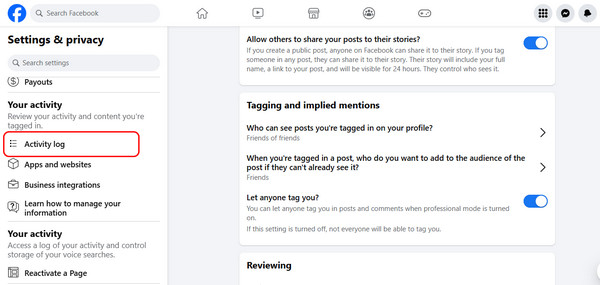
Go to Logged Actions and Other Activity, choose Search History, and hit Clear Searches. This will remove previous searches, making it more difficult for Facebook to apply your history to targeted ads and suggestions.
3. Change Your Ad Preferences
How do I stop Facebook from tracking my Google Searches? Facebook's ad system follows your interests based on what you interact with. To restrict the level of personal information Facebook uses for advertising, you can modify your Ad Preferences. Click your profile picture, click Settings & Privacy, and then select Settings. Next, go to Ads in the left-hand menu.
There, you will see controls controlling how Facebook gathers advertising data. You can opt out of interest-based ads and restrict ad tracking, so Facebook gathers less information about your online activity. Although this will not stop ads from appearing altogether, it will de-personalize the advertising based on your browser activity.
4. Change Your Off-Facebook Activity Settings
Many users don’t realize that Facebook collects data even when not actively using the platform. This happens through off-Facebook activity tracking, where websites and apps share data about your visits and interactions with Facebook with Facebook. To turn this off, go to Settings & Privacy, select Settings, then navigate to Accounts Center.
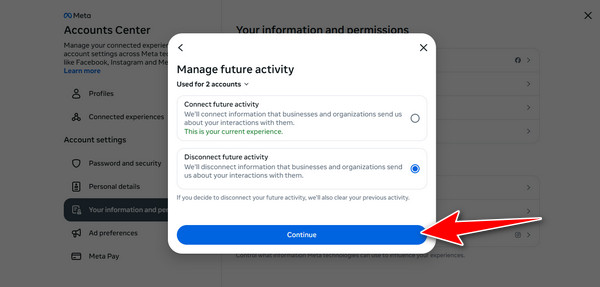
Click Your Information and Permissions, then choose Your Activity Off Meta. Select Manage Future Activity, click Disconnect Future Activity, and confirm. This will stop Facebook from collecting data from other websites.
5. Disable Location Tracking
Facebook employs location tracking to deliver location-based ads, recommend local events, and authenticate login activity. You should turn off this feature if you don't wish Facebook to use your exact location. Turn it off, visit Settings & Privacy, click Settings, and scroll down to Privacy. Click Location, where you can switch off location tracking or restrict Facebook access to your live location. Turning off this feature blocks Facebook from tracking where you are and diminishes its capacity to deliver targeted location-based ads. If you still want to receive ads from other countries, you can change the FaceBook location with the help of a third party.
Conclusion
You can use these Facebook settings to stop tracking and avoid getting bombarded with too many ads from your latest searches. If you want to fake your location to avoid being tracked by it, then it is better to use our third-party tool, which will solve your problem.
Hot Solutions
-
GPS Location
- Best Pokemon Go Locations with Coordinates
- Turn Your Location Off on Life360
- Fake Your Location on Telegram
- Review of iSpoofer Pokemon Go
- Set Virtual Locations on iPhone and Android
- Review of PGSharp App
- Change Location on Grindr
- Review of IP Location Finder
- Change Mobile Legends Location
- Change Location on Tiktok
-
Unlock iOS
-
iOS Tips
-
Unlock Android

